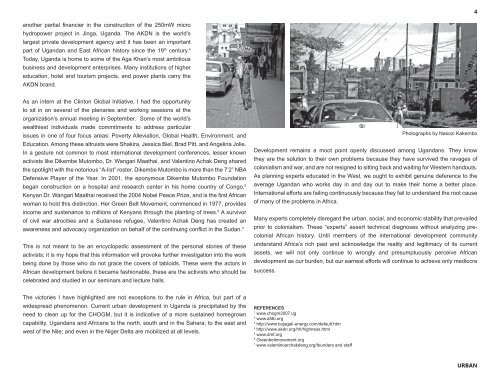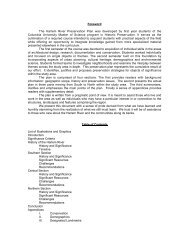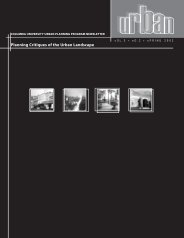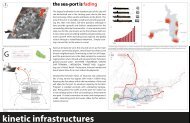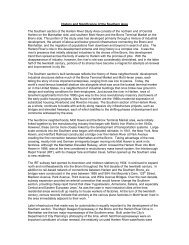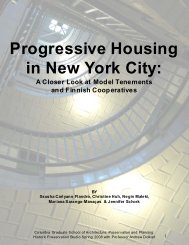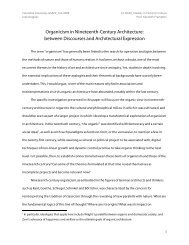The Art of Planning - Columbia University Graduate School of ...
The Art of Planning - Columbia University Graduate School of ...
The Art of Planning - Columbia University Graduate School of ...
You also want an ePaper? Increase the reach of your titles
YUMPU automatically turns print PDFs into web optimized ePapers that Google loves.
4<br />
another partial financier in the construction <strong>of</strong> the 250mW micro<br />
hydropower project in Jinga, Uganda. <strong>The</strong> AKDN is the world’s<br />
largest private development agency and it has been an important<br />
part <strong>of</strong> Ugandan and East African history since the 19 th century. 4<br />
Today, Uganda is home to some <strong>of</strong> the Aga Khan’s most ambitious<br />
business and development enterprises. Many institutions <strong>of</strong> higher<br />
education, hotel and tourism projects, and power plants carry the<br />
AKDN brand.<br />
As an intern at the Clinton Global Initiative, I had the opportunity<br />
to sit in on several <strong>of</strong> the plenaries and working sessions at the<br />
organization’s annual meeting in September. Some <strong>of</strong> the world’s<br />
wealthiest individuals made commitments to address particular<br />
issues in one <strong>of</strong> four focus areas: Poverty Alleviation, Global Health, Environment, and<br />
Education. Among these altruists were Shakira, Jessica Biel, Brad Pitt, and Angelina Jolie.<br />
In a gesture not common to most international development conferences, lesser known<br />
activists like Dikembe Mutombo, Dr. Wangari Maathai, and Valentino Achak Deng shared<br />
the spotlight with the notorious “A-list” roster. Dikembe Mutombo is more than the 7’2” NBA<br />
Defensive Player <strong>of</strong> the Year. In 2001, the eponymous Dikembe Mutombo Foundation<br />
began construction on a hospital and research center in his home country <strong>of</strong> Congo. 5<br />
Kenyan Dr. Wangari Maathai received the 2004 Nobel Peace Prize, and is the first African<br />
woman to hold this distinction. Her Green Belt Movement, commenced in 1977, provides<br />
income and sustenance to millions <strong>of</strong> Kenyans through the planting <strong>of</strong> trees. 6 A survivor<br />
<strong>of</strong> civil war atrocities and a Sudanese refugee, Valentino Achak Deng has created an<br />
awareness and advocacy organization on behalf <strong>of</strong> the continuing conflict in the Sudan. 7<br />
This is not meant to be an encyclopedic assessment <strong>of</strong> the personal stories <strong>of</strong> these<br />
activists; it is my hope that this information will provoke further investigation into the work<br />
being done by those who do not grace the covers <strong>of</strong> tabloids. <strong>The</strong>se were the actors in<br />
African development before it became fashionable, these are the activists who should be<br />
celebrated and studied in our seminars and lecture halls.<br />
Photographs by Nasozi Kakembo<br />
Development remains a moot point openly discussed among Ugandans. <strong>The</strong>y know<br />
they are the solution to their own problems because they have survived the ravages <strong>of</strong><br />
colonialism and war, and are not resigned to sitting back and waiting for Western handouts.<br />
As planning experts educated in the West, we ought to exhibit genuine deference to the<br />
average Ugandan who works day in and day out to make their home a better place.<br />
International efforts are failing continuously because they fail to understand the root cause<br />
<strong>of</strong> many <strong>of</strong> the problems in Africa.<br />
Many experts completely disregard the urban, social, and economic stability that prevailed<br />
prior to colonialism. <strong>The</strong>se “experts” assert technical diagnoses without analyzing precolonial<br />
African history. Until members <strong>of</strong> the international development community<br />
understand Africa’s rich past and acknowledge the reality and legitimacy <strong>of</strong> its current<br />
assets, we will not only continue to wrongly and presumptuously perceive African<br />
development as our burden, but our earnest efforts will continue to achieve only mediocre<br />
success.<br />
<strong>The</strong> victories I have highlighted are not exceptions to the rule in Africa, but part <strong>of</strong> a<br />
widespread phenomenon. Current urban development in Uganda is precipitated by the<br />
need to clean up for the CHOGM, but it is indicative <strong>of</strong> a more sustained homegrown<br />
capability. Ugandans and Africans to the north, south and in the Sahara; to the east and<br />
west <strong>of</strong> the Nile; and even in the Niger Delta are mobilized at all levels.<br />
REFERENCES<br />
1<br />
www.chogm2007.ug<br />
2<br />
www.afdb.org<br />
3<br />
http://www.bujagali-energy.com/default.htm<br />
4<br />
http://www.akdn.org/hh/highness.html<br />
5<br />
www.dmf.org<br />
6<br />
Greenbeltmovement.org<br />
7<br />
www.valentinoarchakdeng.org/founders and staff<br />
URBAN


